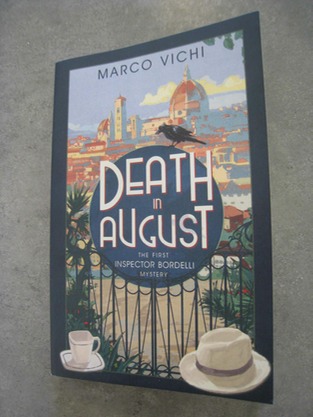Monday, 12 September 2011

While it's always good to get in on the ground floor and start off a crime fiction series right at the beginning, there are certain side issues that emerge alongside the pleasure of making a new and interesting discovery.
In this case, having read and enjoyed Marco Vichi's Death in August those issues include the fact that Vichi's work is translated into English by Stephen Sartarelli, whose regular translation gigs include Andrea Camilleri's Montalbano series. Sartarelli is, as far as I can gather, a full-time translator, but you can't help thinking more commissions means a slower rate of processing the translations…
While it was Sartarelli's presence in the background that drew my attention to Death in August endorsements from, among others, Andrea Camilleri had a bit to do with the order going in, along with references to Florence and food. It certainly seemed like a promising combination.
It's midsummer in 1963 and with most Florentines away on holidays there isn't a lot to keep Inspector Bordelli occupied. An elderly wealthy woman isn't answering the phone but the bedroom light is still on, so her daytime companion contacts the police around midnight. The Signora is one of those people who take their own security seriously, so the companion doesn't have a key to let herself in and investigate matters for herself.
The companion's sure Signora Pedretti has been murdered, so while it's the middle of the night Bordelli, suffering from heat and incessant mosquito attacks, heads for the house in the hills above the city, and finds the Signora's body in bed, apparently the victim of a severe asthma attack.
She had, Bordelli learns, a violent allergy to a particular strain of South American pollen, though a double dose of her medication should have been enough to save her.
Things, however, don't quite add up.
While there's apparently untouched asthma medication on the bedside table, and some in the mouth a number of inconsistencies turn up in the autopsy to suggest foul play.
The question is how anyone could have committed murder without a set of keys or access to the house.
It becomes, in other words a how rather than a whodunnit, and while he's pondering how to prove his suspicions in court, with little else in the way of official duties to occupy his time, Bordelli becomes the mentor of a Sardinian recruit whose father was Bordelli's comrade in the Resistance during World War Two.
Recollections, reminiscences and flashbacks to wartime action take up a substantial part of the story.
The investigation brings Bordelli into contact with the victim's family - an eccentric brother who's an inventor, and a couple of nephews who would expect to benefit from the will, and are, along with their wives, fairly obvious suspects. They're an unlikeable quartet with what seems to be a set of cast iron alibis, so it seems to be a matter of working on them until someone cracks (which in turn revolves around finding the how, doesn't it?)
When he's not reminiscing about wartime experiences, his childhood sexual awakening and the ins and outs of the matter under investigation, Bordelli's planning a dinner party for the circle of acquaintances that will presumably become regular characters as the rest of the series unfolds.